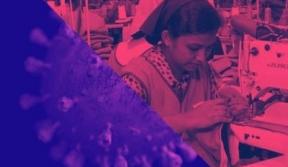For many years the dirty secret of the steadily growing Bangladeshi garment industry has been its disposable workers. The lowest paid garment workers anywhere in the world, hundreds of them have died in preventable factory fires and building collapses during the last two decades, and countless more have been injured. After each tragedy, labor groups have asked: How many more workers will have to die before the industry changes? Workers have demanded “no more fires.”
But the industry has not listened because fires are part of the Bangladeshi business equation. For the international brands that have made Bangladesh one of the largest clothing exporters in the world, it costs less to compensate the families of dead workers than to build safe buildings and maintain reasonable health and safety measures. For the Bangladeshi government, rock-bottom wages, poorly enforced health and safety standards, and weak building codes are the recipe for success in an industry that generates 75% of the country’s export earnings. So each and every year the precarious industry has continued to grow, and workers have continued to die. The causes of death everybody knows: damaged and overloaded electrical systems; large quantities of poorly-kept flammable materials; absent or inadequate firefighting equipment; locked doors or blocked aisles; and no emergency planning and evacuation plans. All are entirely preventable causes.
Today, however, there is a ray of hope for Bangladesh’s garment workers that the day will come when they no longer have to fear fires and building collapses at work.
A large apparel company has for the first time agreed to a legally-binding, enforceable, and well-funded fire and building safety program containing the following path-breaking elements:
- Independent and publicly-disclosed building inspections directed by a chief inspector with no ties to the industry.
- Mandatory and time-bound factory renovations and reparations to eliminate building and fire hazards.
- Incentives to factories for compliance in the form of orders and fair product prices.
- Workers’ voice: workers can report health and safety hazards confidentially to the chief inspector or to mandatory health and safety committees in their own workplaces.
- A safety training program with trade union participation.
The International Labor Rights Forum and other labor groups signed the Joint Memorandum of Understanding on Fire and Building Safety (MOU) with the Phillips-Van Heusen Corporation (PVH Corp), one of the world’s largest apparel companies, in the days before an ABC exposé of some U.S. brands that have benefitted from the shoddy health and safety standards in Bangladeshi garment factories, among them PVH’s Tommy Hilfiger line, and Gap and Kohl’s brands. Labor stakeholders in Bangladesh as well as international unions and non-governmental organizations support the agreement. On the international side, the Worker Rights Consortium, the Clean Clothes Campaign, the Maquila Solidarity Network, and the International Textile, Garments and Leather Workers Federation helped to negotiate the agreement. Seven Bangladeshi unions and NGOs have signed it.
The fire and building safety program, financed by participating companies, will go into effect when at least three other well-known international brand owners sign the agreement. Now other brands need a push to save the lives of Bangladeshi garment workers. Please sign this petition to urge every brand that buys garments in Bangladesh to join the agreement. Tell them to erase fires and building collapses from their business equation.


Comments
re: ILRF Hails Landmark Bangladesh Fire and Building Safety Agre
You think this is new? The garment center has been using child labor and bad factories from day one, I have worked for companies that I have gone in and done audits for-failed for child labor, human rights violations-and when I refused to work in these factories I was threatened or fired. It will never change, audit companies are bribed, production managers paid off , it is so corrupt and no laws are enforced.I called over 20 agencies to help -and noone would or they passed me off to someone else. I quit the industry because there r no morals, no ethics no standards. The big guys are the real culprits-i know because I worked for them !
re: ILRF Hails Landmark Bangladesh Fire and Building Safety Agre
As long as stores demand cut throat pricing and the consumers do to- there will be vendors who will do anything to compete-It is worse in a bad economy like this-2/frs, buy one get one free, 3 for x amount of dollars- who do you think is going to make this? When China labor is to high, Bangladesh, then Kavakastan, then some other 3rd world country to exploit- We need to set up regulated ,mandated programs to comply with fair labor practices or stop export of these goods from those factories and countries-that will never happen. As long as there is consumer demand-there is supply- Why not do a viral video to show the world the clothes on their backs are being made by starving children in horrific conditions-maybe the you will get some attention
re: ILRF Hails Landmark Bangladesh Fire and Building Safety Agre
poorly enforced health and safety standards, and weak building codes are the recipe for success in an industry that generates 75% of the country’s export earnings. So each and every year the precarious industry has continued to grow, and workers have continued to die.
re: ILRF Hails Landmark Bangladesh Fire and Building Safety Agre
Can you please publish who wrote and who has a vested interest in the fire safety agreement? I read it and it appears that there are some self interests in it. It doesn't appear any company has endorsed or adopted it. There are no specifics, no audit program, no standard listed. The current signatories are all conditional signatories. Further there is no explanation on how funds collected will be spent. Who is executing the inspections, who are they accountable to? I wonder if this is another self interest program to hamper the international efforts which are truly in place. My feeling is that the multinationals who work in Bangladesh do more good than harm. They appear to be sincere in their efforts to bring about social and economic change to the country. Remember the conditions our developed nations 50 years ago? Well Bangladesh is currently going through these same changes, which is fuelled by international businesses. Don't hamper them, work with them. Don't scare them away from working in Bangladesh, leave them alone to work out the issues. Sure, there will be some corrupt or illicit encounters and people on both sides, but overall I believe they are genuine to help develop the country and ensure social development and human rights developments. Look at countries where no international business is, they are much worse off.
re: ILRF Hails Landmark Bangladesh Fire and Building Safety Agre
@Peter: There are now 70+ companies in the Accord on Fire and Building Safety, including Abercrombie & Fitch, American Eagle, Benetton, H&M. The full list is in the footer at http://laborrights.org/safety.
Here's the latest copy of the agreement - it should answer some of your questions: http://laborrights.org/safetyaccord
The Accord was initiated by Bangladeshi unions, the global union ITF (now IndustriALL), and the Clean Clothes Campaign, International Labor Rights Forum, and Worker Rights Consortium in negotiation with companies.
In a completely separate initiative, 17 US retailers have just released the details of a program that they're starting. Now, this is the one to be skeptical of; it didn't have any meaningful worker representation in the drafting. For more on our thoughts, see http://laborrights.org/walmartgaprebuttal